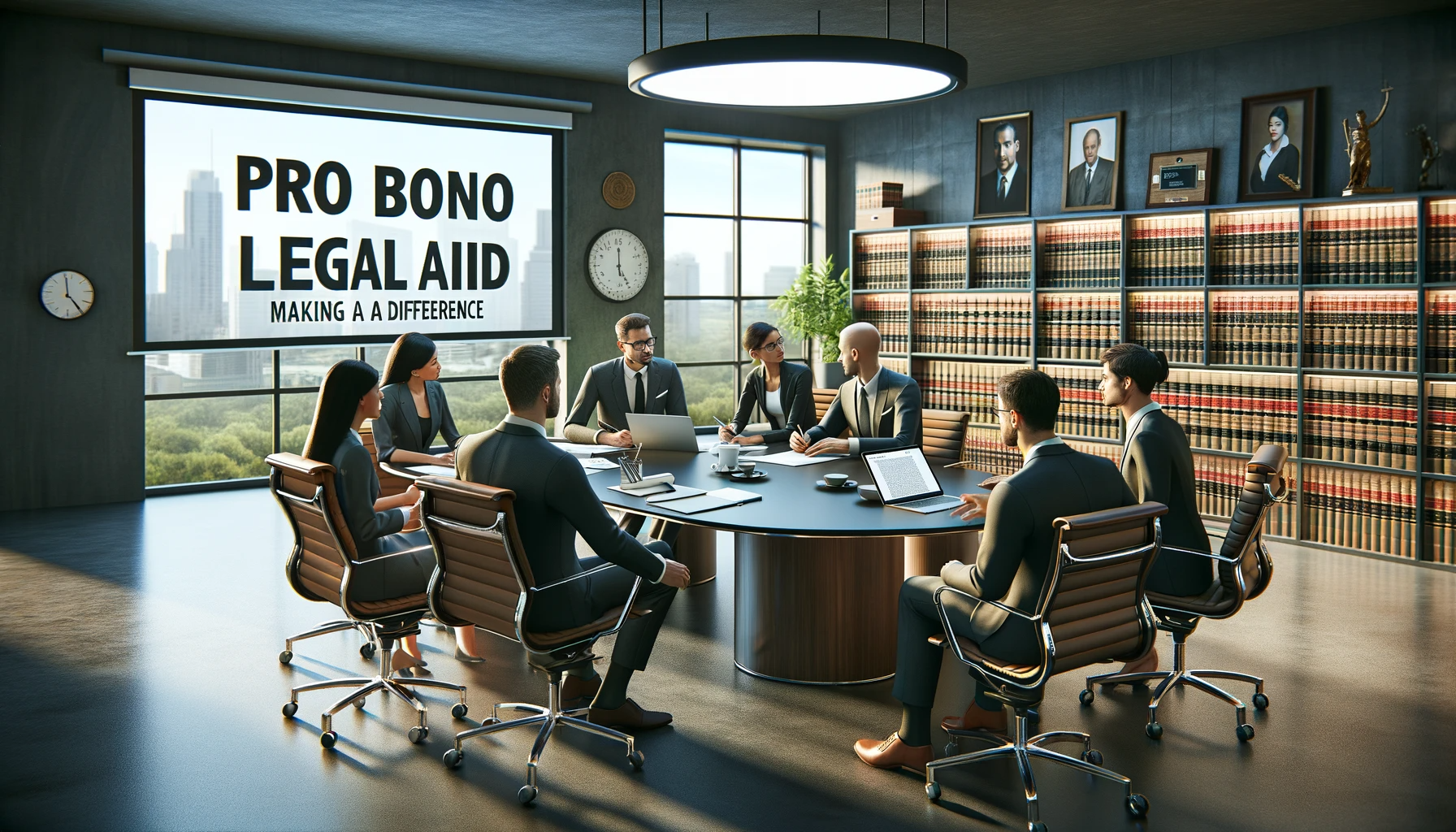Understanding Free Legal Aid in the USA
Introduction to Free Legal Aid
Free legal aid in the USA, often referred to as “pro bono” work, is a fundamental part of the justice system. It represents legal services provided free of charge, or at significantly reduced rates, to individuals who cannot afford the cost of legal representation on their own. This concept ensures access to justice for all regardless of wealth, making the legal system more just and equitable.
Sources of Free Legal Aid
There are various sources offering free legal aid in the USA. These include non-profit organizations, legal aid clinics, public defense attorneys, and private lawyers willing to do pro-bono work. These entities provide help in a range of issues, from civil to
Criminal matters, ensuring those with low income can navigate the law and receive a fair hearing.
Eligibility for Free Legal Aid
Eligibility for free legal aid depends on multiple factors. It includes an applicant's income level, type of legal issue, residence status, and availability of legal aid resources. In general, individuals must prove they cannot afford a lawyer, and their case must have merit. Additionally, priorities are often set so that certain circumstances or types of cases are given preference.
Types of Cases Covered by Free Legal Aid
The types of cases covered under free legal aid vary widely depending on the resources of a particular source. However, legal aid typically focuses on civil matters such as family law, housing issues, public benefits, immigration, and domestic violence cases.
Criminal cases are usually not covered unless the defendant risks significant jail time, in which case a public defender is typically appointed.
Limits and Challenges of Free Legal Aid
Despite its principal purpose, free legal aid has its limitations. The demand for these services often outweighs the supply, leading to long waiting periods and selectiveness in accepting cases. Furthermore, legal aid providers often lack resources to handle complex cases. Finally, there are limitations in terms of the geographical reach, with many rural areas having less access to these services. Despite these challenges, free legal aid remains a crucial element in ensuring access to justice for all.
Eligibility Criteria for Free Legal Services
Understanding the Basics of Eligibility
To qualify for free legal services in the USA, several criteria must be met. These eligibility conditions are set and enforced by legal service providers to ensure fair access to those who need it the most. The rules can vary from state to state and between organizations but generally consider your income level, nature of your legal problem, residency status, and sometimes, your age or disability status.
Income Level Limitations
Your income plays a significant role in determining your eligibility for free legal services. Most organizations follow federal poverty guidelines to set their income eligibility standards. Typically, you must have an income level that falls below 125% of the Federal Poverty Level. However, some organizations may allow those with income up to 200% of the poverty level in certain circumstances. Documentation like pay stubs and tax return forms will be required to verify your income.
Type of Legal Issue
The nature of your legal issue is also an important factor. Not all legal issues are covered under free legal services. Generally, civil cases such as family disputes, housing problems, public benefits issues, and immigration matters are catered to.
Criminal cases are usually not addressed – there is a separate system in place for individuals who can’t afford a lawyer in
Criminal cases.
Residential Status Requirement
Residential status is another eligibility criterion. Typically, you must be a U.S. citizen or a legal resident to be eligible for free legal services. However, certain exceptions can be made, especially in cases involving domestic violence or human trafficking. Non-profit legal aid societies might also provide help to undocumented immigrants seeking assistance with immigration matters.
Special Consideration Cases
In certain cases, exceptions to the typical eligibility criteria might be made. These special cases often involve elderly citizens, individuals with disabilities, victims of domestic abuse, and veterans. These groups might qualify for free legal services regardless of their income level due to the vulnerabilities they face. Always inquire with the specific legal aid organization regarding these exceptions.
Finding Local Legal Aid Organizations
Understanding Legal Aid Organizations
Legal Aid Organizations are non-profit agencies that provide free legal help to people who cannot afford to hire a lawyer. Many of these organizations focus on specific areas of law, such as housing, immigration, or family law. They often prioritize services based on income, nature of the case, and the client’s vulnerability, helping those most in need.
How to Locate Legal Aid Organizations
The first step in finding local legal aid is to identify the organizations that serve your area. A good starting point is the Legal Services Corporation's online directory. This resource provides a list of legal aid organizations by state. Another excellent tool is LawHelp.org, where you can search by state and legal issue. Both databases are free to use and will provide you with contact information for the organizations.
Applying for Legal Aid Services
Once you have identified a few potential organizations, contact them for more information. Keep in mind that each organization has its own application process. Generally, you'll need to provide details about your income, family size, and legal issue. If you meet their criteria, they may provide you with a free lawyer.
Other Local Resources
In addition to legal aid organizations, there might be other resources in your community, such as law school clinics and pro bono programs. Some local bar associations also have programs where lawyers volunteer their time to help people who can't afford legal services.
Navigating Legal Aid Limitations
It's important to note that legal aid organizations have limitations. They do not have the resources to help everyone, and not all types of cases are covered. Therefore, if one organization cannot help you, don’t be discouraged. Try reaching out to other organizations or resources as not every aid organization may cater to your specific needs.
Making Use of Pro Bono Services
Understanding Pro Bono Services
Pro bono services are essentially free legal aid provided by attorneys who are looking to give back to the community. The term "pro bono" is derived from the Latin phrase "pro bono publico," which means "for the public good." These services aim to assist those who are unable to afford legal representation and other aspects of legal proceedings.
Finding Pro Bono Lawyers
To access pro bono legal services, you must first find a lawyer willing to take on your case free of charge. This can be done via local bar associations, law schools, or platforms such as the American Bar Association's 'Find Legal Help' portal. Non-profit organizations and legal aid societies also often have lists of lawyers who offer pro bono services.
Qualifying for Pro Bono Assistance
While pro bono services are often intended for those with limited financial resources, each lawyer or law firm may have their own set of eligibility criteria. Typically, you must demonstrate financial need, which may involve disclosing income and assets. Sometimes, the nature of your legal issue may also play a role in your eligibility. It's essential to understand these requirements before applying for pro bono services.
Engaging with a Pro Bono Lawyer
Once you've found a lawyer willing to provide pro bono help, it's important to prepare for your initial meeting. This might involve gathering relevant documents, understanding your legal problem, and devising a list of questions for your lawyer. Remember that even though the lawyer is offering their services free, they are still providing professional legal counsel; thus, respecting their time and expertise is vital.
Leveraging Other Free Legal Resources
In addition to direct representation, pro bono services may also include free legal clinics, hotlines, and informational resources. Many bar associations and nonprofit legal organizations offer these services to help individuals better understand their legal situation, even if they do not need or qualify for full pro bono representation.
Utilizing Law School Clinics for Legal Assistance

Understanding Law School Clinics
Law school clinics are a not so well-known but highly useful resource for free legal assistance. These are essentially training grounds where law students offer pro bono (free of charge) services under the supervision and guidance of experienced attorneys or their professors. Services provided typically cover a range of legal issues, from immigration to family law, and from
Criminal defense to intellectual property rights.
How to Access Services at Law School Clinics
To access these services, your first step should be to locate a law school clinic near you. Your simplest approach would be to research online or contact local law schools directly for more information about their clinics. You need to bear in mind that some clinics might have specific requisites such as income limits, or they might only take on certain types of cases. Additionally, availability may be based on the school term; hence, services might not be accessible year-round.
What to Expect From Law School Clinic Assistance
Remember that while these are students, they are diligently supervised by experienced attorneys or lecturers. This means you can expect a reasonably high standard of assistance. However, since it is a learning situation for them, be prepared for the process to take longer than it might with an established attorney.
Benefits and Limitations of Law School Clinics
The benefits of using law school clinics as a source of free legal assistance are numerous. Apart from saving on costs, which can be substantial, getting help from eager and fresh minds can bring a new perspective to your case. But like all good things, this too comes with its own set of limitations. The most significant of them being availability – clinics may not be available in all areas, and even if they are, they may not provide the specific legal services you require. Further, as previously mentioned, the process could be time-consuming. Nevertheless, the benefits often outweigh the drawbacks for those in need of free legal aid.
Making the Most out of Law School Clinics
To make the most out of law school clinics, make sure you go in thoroughly prepared. Have all your documents ready and organized, and be prepared to clearly explain your situation. Remember that these students are there to learn as well, so any experience they gain from working with a wide range of cases is beneficial for them too. Your patience and cooperation will not only help your case but also contribute to their learning process.
Exploring Online Legal Help Platforms
Understand the Concept of Online Legal Help
Online legal help platforms are essentially digital spaces that provide various forms of legal assistance. These range from providing informational resources, document templates, attorney directories to even offering direct legal advice. These platforms are designed to simplify the complex legal landscape and are an excellent starting point for someone in need of legal aid but without the financial capacity to hire a lawyer.
Assessment of Prominent Platforms
There are several key online legal help platforms worth considering in the United States. For instance, 'Legal Services Corporation' is a nonprofit established by Congress that enhances access to justice through its nationwide network of legal aid programs. Another platform, 'Avvo', provides a directory of lawyers, legal advice, and other tools. 'Rocket Lawyer' and 'LegalZoom' offer easy-to-create legal documents along with other legal services. It is important to assess the strengths and weaknesses of each platform, considering factors like the credibility of sources, ease of use, quality of advice and available support channels.
Navigating Through Free Legal Advice Online
Some of these platforms offer 'free' legal advice. This typically comes in the form of Q&A forums where users can post questions to be answered by legal professionals. However, it's important to be cautious when using these services as the advice given might not be specific to your situation or jurisdiction. Always ensure to verify the qualifications of the person providing the advice.
Using Online Legal Document Services
Many online platforms offer free or low-cost legal documents. Users can fill out these forms for a variety of legal needs, such as creating a will or filing for divorce. These services can be a valuable resource, especially for simple legal matters. However, keep in mind that while these documents can be legally binding, they may not fully address your specific circumstances or meet the legal requirements of your state.
Digital Legal Aid Application Processes
Some online legal help platforms assist users with applying for traditional legal aid services. Typically, the user completes an online application outlining their financial situation and details of their legal issue. The platform will then determine if the user qualifies for free or reduced-cost legal assistance based on the information provided in the application. This can streamline the process of obtaining legal aid and make it more accessible to those in need.
Additional Resources and Tips for Free Legal Support

Utilizing Pro Bono Services
Pro bono services are free legal help provided by lawyers volunteering their time to those who cannot afford to hire a lawyer. Many law firms, bar associations, and lawyer referral services offer pro bono services as part of their commitment to social responsibility. Contact such organizations directly or search for "pro bono legal services" online to find resources available in your region.
Exploring Legal Aid Societies
Legal aid societies are non-profit organizations that provide free legal services to people who cannot afford them. They often focus on specific types of legal issues, like family law, immigration, or housing. You can look for local legal aid societies in your area, or check the Legal Services Corporation’s website, a national network funded by Congress to provide low-income individuals with high-quality legal representation.
Engaging Law Schools
Many law schools run legal clinics where law students, supervised by their professors, provide free legal services. These clinics can be a good source of free legal advice, representation, and referrals. Make use of this tip by researching nearby law schools that run such clinics.
Checking Out Online Platforms
There are numerous online platforms like JustAnswer or Avvo where you can ask legal questions, and receive answers from licensed lawyers for free or at a very low cost. While these resources should not replace a full legal consultation, they can give you an initial understanding of your situation and guide you on next steps.
Considering Dispute Resolution Centers
Dispute resolution centers offer free or low-cost mediation services which can sometimes substitute for legal interventions. Mediation can help parties reach a mutually beneficial agreement without going through a court trial. Check your local community resources for such centers.
Conclusion
Obtaining free legal representation in the USA can be a daunting task, but it is feasible through a variety of avenues, including legal aid organizations, pro bono programs, and other resources. Familiarizing oneself with the eligibility requirements and the range of options available is crucial for individuals in need of legal help but are hindered by financial limitations. By exploring these resources and understanding the criteria, individuals can access the legal assistance they require without the burden of high costs.
Look for an attorney who has the right legal resources for your legal needs.
Contact us here on the
Warmuth Law website or through our hotline 888-517-9888.
Frequently Asked Questions (FAQ's)
1.Can I get a free lawyer for any legal issue in the USA?
While free legal assistance is commonly offered for civil cases, it's important to note that not all legal issues may qualify for free representation. For example, complex civil litigation or
Criminal cases may not always be covered by free legal aid programs. Additionally, the availability of free legal services can vary based on factors such as location, the specific legal matter, and the capacity of local legal aid organizations.
2. How do I qualify for free legal aid in the USA?
To qualify for free legal aid, individuals typically need to meet certain income guidelines, which vary depending on the organization or program. Additionally, the nature of the legal issue is considered, as priority is often given to cases involving critical needs such as safety, shelter, or livelihood. Some legal aid organizations may also consider factors such as household size and expenses when determining eligibility.
3. What is pro bono legal representation?
Pro bono legal representation plays a crucial role in ensuring access to justice for individuals who cannot afford legal fees. Pro bono attorneys may take on cases ranging from simple legal advice to full representation in court. This voluntary service helps bridge the gap in access to legal services for low-income individuals and underserved communities.
4. How can I find free legal aid in my area?
To find free legal aid in your area, you can start by contacting your local legal aid organization, which is typically a non-profit organization that provides legal services to low-income individuals. Bar associations and law schools often have referral programs or clinics that offer free legal assistance. Additionally, online resources such as state bar websites or legal aid directories can help you locate free legal services in your area.
5. Are there online resources for free legal advice in the USA?
Online resources for free legal advice can be a valuable resource for individuals seeking information on legal issues. These platforms often offer articles, FAQs, and forums where users can find answers to common legal questions. Some online resources also provide access to legal professionals for consultation through email, chat, or phone. However, it's important to verify the credibility of the source and seek advice from licensed attorneys when dealing with complex legal matters.













